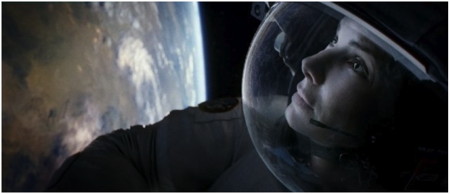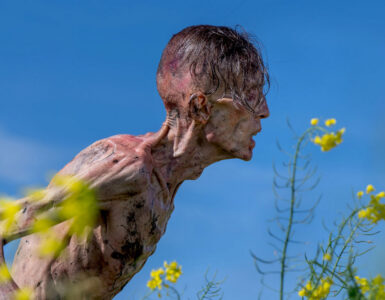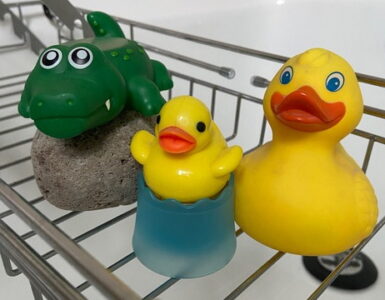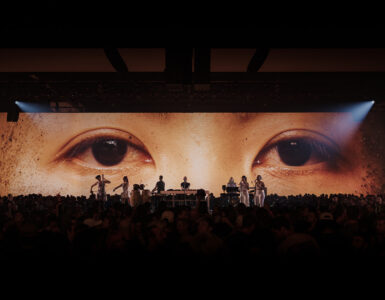You’re probably thinking, Sandra Bullock – lost in space… How interesting can that be? Surprisingly – very! Gravity is gripping, tense thriller with an emotional through-line that is never overplayed. Despite its early vertigo-inducing sequences of stars Sandra Bullock and George Clooney being flung about in space, director Alfonse Cuarón, who co-wrote the screenplay with his son Jonás, has fashioned a suspenseful drama whose story concept is beautifully sustained throughout its taut 90 minutes.
In the film, now showing in 3D, 2D and IMAX 3D cinemas, Bullock and Clooney play astronauts attempting to return to Earth after debris crashes into their space shuttle during a space walk, leaving them drifting alone in orbit.
Renowned for his visionary filmmaking style, Cuarón’s seventh feature Gravity has been a long time coming; it’s the first since his dystopian downer Children of Men (2006). As a follow up, this sci-fi drama is possibly his most ambitious and gutsiest endeavor to date, not just for its groundbreaking technical achievements but also for its purity of storytelling.
Appearing recently at Comic-Con to promote the movie, Cuarón admitted that “the whole film was a miscalculation,” in that it took four-and-a-half years to develop and bring to the screen. Indeed, with its stellar SFX shots, we are finally at a ‘photo real’ replication of a space walk on screen. In terms of its technical specs, Gravity is cutting-edge.
Interview with Sandra Bullock:
Q: It’s such a challenging film and a challenging role, so what attracted you to it in the first place?
SB: You look at every film of Alfonse’s and you feel it was a reminder to you to stop wasting your life, and when I saw Y Tu Mama Tambien, I was floored. I was like, I don’t know how this filmmaker told this story, because every time I had a script, I was like, ‘Do you think Alfonse Cuarón will do it?’ (laughter) But when it came about, it wasn’t at a time I was wanting to work or anything, it was out of left field and it was just one of those moments that it, and he was asking me to do things that were the most frightening things for me. Flying, we were going to do the vomit comet where we in a plane and diving down, we were going to, but we didn’t at the end. But this is maybe the universe saying, look at those things that have brought you so much fear, and just do them. And then maybe they won’t be so scary anymore. Maybe they will, but if you are going to do it, do it with a person whose artistry and work you have admired and it’s one of those moments in life where it’s once in a lifetime and you either do it a thousand percent or give yourself a thousand percent, or else there’s no reason to be stepping into the arena with someone like that, because that’s what he did in writing it and creating it and he spent years of his life making, you built this and then you step into it and you want to be able to return.
Q: How was it working with Clooney?
SB: It was like light coming in–it was like the circus came to town. I know George, he makes out like we have known each other a lot longer, but that would make me 75. (laughter) George and I have known each other a long time, long before we both had careers.
George is a great collaborator. George makes everything look effortless because that’s his charm and his wit. George works his ass off 24/7 so he came on set, ready to support Alfonse in whatever Alfonse needed, they were able to speak as filmmakers, he knew what was needed, he brought a joy and humor and a lightness, but the minute the camera rolls, we are all very succinct and when there’s a timing off, he is just who he is and what he does for a living, because he’s a team player. He is not somebody that has to be, it is all about me right now. He knew it was all about the story, executing this story that was bigger than all of us, and we knew our parts in it, and you just want someone like that on your side. So Alfonse was always on your side, he was our caretaker, our therapist, your dictator, your mentor, and then George came and we all went oh, there’s just lightness and fun, and it reminds us why we like working in the business.
Q: Can you tell us a little bit about the emotional journey that Dr. Ryan goes through?
SB: You don’t ever want to lose a child, so someone that is brilliantly heady and does what she does, loses all the emotion in her life, loses seemingly all the love in her life, and she loses her child, what would that person do? And to me, my first instinct was remove anything that would ever remind you that you had a child. Just to cope, you just deal with your head, lose anything physically that reminds you that you are a woman, that’s why I got her down to the sort of physicality that she was, just basically, her body is a tool, and all she has left is her mind in the perfunctory day to execute what she does, this task that she is brilliant at, and how does a person like that operate every day? It’s redundancy, it’s just do those things that don’t get you off the track, to remind you of things that your life was about, you just become robotic. And her taking the opportunity to go to space to do this was matter of fact robotic, and it was simply to execute something that she brilliantly came up with, she was going to execute the plan and go back to her whatever, it’s not even a life that she had anymore, but just the existence within this world that she was not a part of.
Q: Obviously a big factor in the movie is that you are very much alone in space and also in your life, because you have lost your little girl, but there is absolutely no mention of a father or a husband and I think we imply or infer that there isn’t one. I am wondering if that was a deliberate omission?
SB: It wasn’t a necessary part of telling the story. I know what I had in my head, I know what Alfonso had in his head, you need those stories in a romantic comedy and it’s not what this is. This is a story about a woman’s loss or her child. If you had six hours to tell the story in flashbacks, you would see what we knew—what the backstory was—but what we needed to convey, everything was there.
And also what is so beautiful is that it shows that you never know where help is going to come from, from what human being. You isolate yourself so much, the beauty is in how a human being can give you the moment of life and it being the most unexpected. And I think that is a beautiful aspect of this film in that we don’t expect humans to help, they give and you see that in this in such a beautiful way.
Q: What exactly was the technology used to simulate being in space?
SB: Think of it this way, an animated film animated to a voice. We try to do most of it live action. And however you could do that based on the wire system, a cube, parts of your body doing it at one point, and then mathematically sewing it together, because we shot sequence out of sequence, piece by piece, when it was a wire system, single wire system, LED box, and then 250 separate Artisans computer geniuses were working on each frame of the film at one given time.
Q: To do the CGI?
SB: Everything. So basically overlaying all that over a human body.
Q: And you were suspended and something that’s supposed to be floating was also on a wire?
SB: Everything was imagined. But my body was basically doing, everything was at 30 percent, it was like ballet… My body motions. Everything had to be at 30 percent speed and had to be able to go the way that the motion would be while your face and mouth went normal time.
Q: What kind of research did you do, and also you have the training, what kind of training?
SB: The big concern was how does one move in space? And the best analogy I got from astronauts was it’s as though your body is surrounded by balloons and you are pushing against them, and so to move you arm like this, it’s like you are pushing against a balloon. So once you realize that every part of your body when you turn, it’s almost like you are exerting some kind of force, like this weird force, it’s like you have a program with your body into always moving like that, no matter what.
Q: It’s like Tai Chi.
SB: It kind of is. But it’s also knowing that the minute you push, you could take one of your hairs, push it off the wall, and it would push your body. So everything was moving and everything in space keeps moving until it hits something else and that keeps moving. So to me what was really important was to have your body trying and sell that we are in zero G all the time. Because we are not in zero G, and I never wanted there to be a moment of, she moved, she moved a little fast. We knew where it was appropriate and we had oxygen, so that to me was the most important thing, I wanted to understand the board, the board of the machinery I was working with, yes, we had the Russia and the China station, and I wanted to understand the basics of what these boards would be and how they would have been similar to the American board, so when she got in there, there’s a strategy, they go, this is where the launching things are, this is where the navigation is, this is where, oh so, how does she know the Russian Space Station, cause there’s a logic to how they do these things based on how they work. And having those minds there, they are like, no you wouldn’t do this, so having that understanding mechanically, I think the most important thing was how someone got so lost emotionally, got so void of emotion, and what happens to a person when they are that much of a shell and they don’t care anymore. That’s all they care about is just dealing with this mechanism that she made, this is what she is doing, she’s not there to make small talk, she doesn’t want to hear George’s character talk, she’s not here for niceties, just get me over here, and what kind of person, how does a person that has allowed themselves to be just, she’s just a robot, she’s not even human anymore. She’s debris, made up of these emotions that she had that are now gone and someone who has lost life and didn’t care about getting it back. What is that journey, what has to happen for that person to care? Just care, even if the end result is, that’s it, life is done, to have that let go moment of, I am ready to let go and I am grateful. So that’s the journey that to me was really crazy to think about. To think about what it is like to lose a child, you just put yourself in that head space every day, like you need to go home and just plant something, you want something amazing to happen, that gives you faith in the birth process of life and death.
Q: There’s a very beautiful moment when George’s character is asking you about what would you be doing now if you were on Earth and you talk about the radio and she also talks about the dog and the child crying, and I thought it was very beautiful because it’s the small things in life that she would miss that you don’t really appreciate, that you would miss if you were lost in space. So what are the things that you would miss, the small things you would miss if you were lost in space?
SB: My son would be up there with me. (Laughter) And my dogs. (laughs) Kids, dogs, all up there, space dogs. It’s true though, the thing that I think we struggle with, being so much as human interaction, and the thing that we go ugh, I wish everyone would just leave me alone or think the same as we do, if you are so isolated up there, I long for any kind of human interaction, just in a shooting day. Whatever state of mind I was in at the time, I appreciated the person coming to take my helmet off and how gently he did it. And there was a method to the madness, even if I was in a hurry to get out, he had a method, he didn’t want to catch my hair, he knew if this thing pinched, he knew I was in pain here, so everything, I just relaxed, and was in his care. And then our sound guy Chris at the end of the day, why don’t I play some music that makes her happy? It was so sweet.
Gravity is now showing in 3-D and IMAX cinemas throughout Los Angeles.





